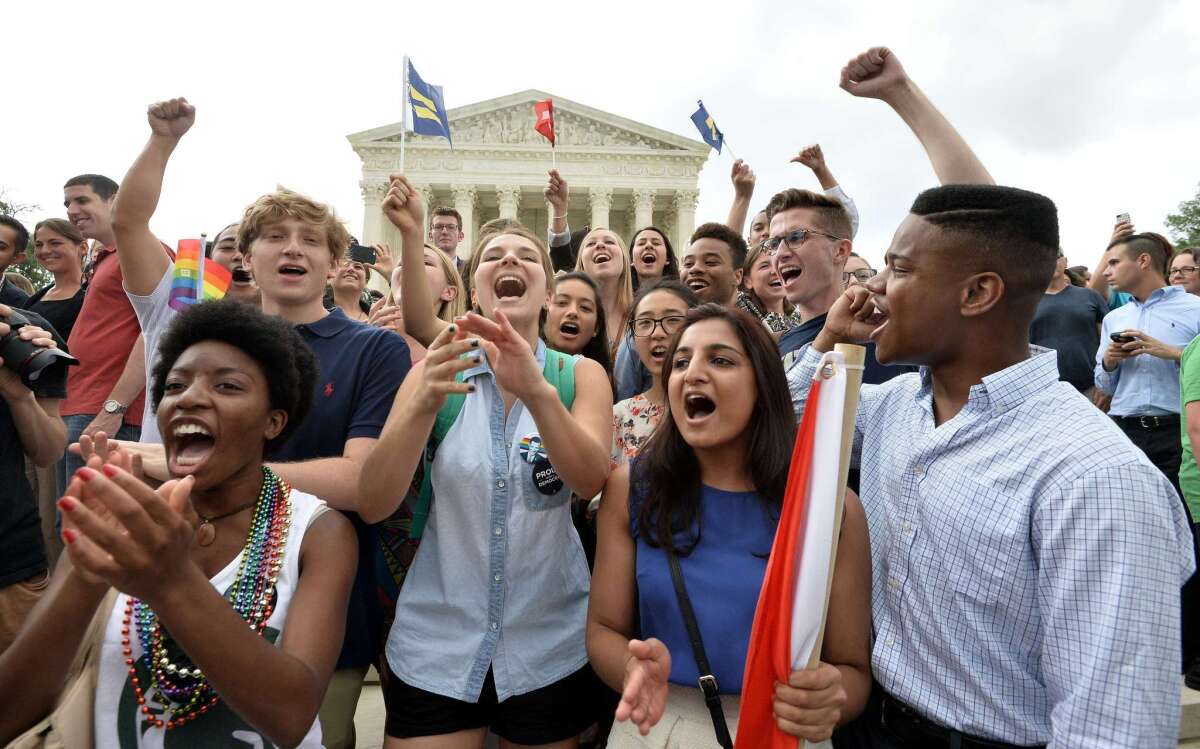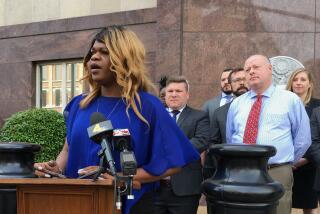Supreme Court ruling: Elation, surprise and pockets of resistance

People celebrate outside the Supreme Court on Friday after its historic decision on same-sex marriage.
Bleu Copas, a gay Army veteran, watched in dismay nine years ago as his state voted overwhelmingly in favor of a ban on same-sex marriage. The momentum gaining strength in other parts of the country seemed to pass Tennessee by.
On Friday, though, the legal tide that has opened the doors of marriage to same-sex couples across the country broke through the region’s deep strain of conservatism, as the Supreme Court declared same-sex marriage a constitutional right in all 50 states. The ruling quickly put people such as Copas at odds with traditionalists, who vowed to fight or at least try to delay what is now the law of the land.
Read the full Supreme Court decision on gay marriage
From Texas to Tennessee and in several Midwestern states that had same-sex marriage bans in place, the court’s ruling was seen by many as a move to deprive states of the right to determine their fates. Nowhere does that feeling sting as sharply as in the deep South, where conservatives already this week were facing challenges to the Confederate flag and to their attempts, along with others across the country, to scale back the adoption of national healthcare reform.
“This is the worst by far of those decisions,” said Matt Kidd, the executive director of the Foundation for Moral Law in Alabama, which has fought same-sex marriage. “I think there is probably nothing that is more of a building block of our communities than family and marriage. The communities, and the families in our communities, have to be able to set their own standards.”
Alabama Gov. Robert Bentley said that he disagreed with the ruling but that his state would uphold the law. His grudging acceptance of the court’s decision was echoed by officials in most of the 13 states with same-sex marriage bans on the books. They included the non-Southern states of Michigan, Ohio, Nebraska and the Dakotas.
In Louisiana, Mississippi, and Texas, though, governors and attorneys general made it clear that they were not willing to give up the fight, and their words led to confusion as couples rushed to get marriage licenses only to encounter court clerks who were unsure of what to do.
Louisiana Gov. Bobby Jindal, a Republican presidential candidate who is also a Catholic, said that marriage “was established by God, and no earthly court can alter that.”
Even in Tennessee, where the attorney general said he would abide by the new law, there were obstacles.
Copas, who was kicked out of the Army in 2006 for being gay, left work as soon as he saw news of the Supreme Court ruling. His first stop was to pick up his fiance, Ricky Shaw, at their Knoxville home. Then it was on to the county clerk’s office for what they hoped would be the issuance of their marriage license.
“I am elated,” Copas said minutes after the ruling was announced. “To be honest, in this moment I feel more American than I’ve ever felt.”
A few hours later, though, Copas and Shaw had given up. The court clerks said they were waiting for instructions on whether to issue marriage licenses. Some said they would not issue any until July 1.
“We were discouraged and just went to get lunch,” said Copas, who planned to try again Monday. In Michigan, Zachary Waasdorp and Colby Touchin encountered no such resistance. Even if they had, the couple had some experience at the altar. Two years ago, Waasdorp and Touchin had been so certain that same-sex weddings would be legal in their state that they scheduled their wedding ceremony for June 20, 2015.
They held the ceremony—minus the license—and on Friday, they made their way to the courthouse to be first in line for a marriage license in Kent County.
“We were one of the last to be married illegally earlier this week, and now we’re one of the first to be married legally,” Waasdorp said. “ No matter what happens we’ll be part of history.”
Petrina Bloodworth and Emma Foulkes, who live in Atlanta, had been together for 10 years, but didn’t tie the knot officially until Friday, when they were the first among dozens of couples at the license office to be wed.
Georgia had filed a friend of the court brief opposing the expansion of same-sex marriage; the couple said they had considered getting married elsewhere but that would have created problems when they came back home, where their marriage would not have been recognized by their own state.
On Friday, the marriage license office was serving slices of cake, and Bloodworth and Foulkes seemed shocked when a reporter congratulated them on becoming wife and wife.
“It’s just we hadn’t heard that before,” said Bloodworth. “This is the first time.”
In Louisiana, Mississippi and Texas, the future for same-sex couples was hazy, at least in the short term, as state officials vowed to resist the change. While he acknowledged that the high court’s decision is “the law of the land,” Mississippi Atty. Gen. Jim Hood said Friday he would not allow licenses to be issued until a federal appeals court lifts its stay of a lower court order overturning the state’s ban on same-sex marriage.
Hood, the lone Democrat holding state office in Mississippi, said it could take several days for the 5th Circuit Court of Appeals to either lift the stay or issue an order clearing the way for same-sex marriages.
Only three couples tied the knot in that state before its attorney general put a halt to issuance of licenses.
Texas Gov. Greg Abbott said he would order state agencies to “prioritize the protection of Texans’ religious liberties.” He said he would be looking for ways to ensure that people who don’t want to perform same-sex marriages do not have to.
That didn’t discourage Mark Phariss and Vic Holmes, partners of almost 18 years.
They were two of the plaintiffs in the Texas case challenging that state’s ban on same-sex marriages, and they said they had booked a wedding for November in Frisco, Texas.
“Today’s decision reaffirms the American principles of freedom, justice and equality for all,” Phariss said. “Let freedom ring!”
Times staff writers Molly Hennessy-Fiske, Maria L. La Ganga, Michael Muskal and Natalie Schachar contributed to this report.
Follow @TinaSusman for national news
More to Read
Sign up for Essential California
The most important California stories and recommendations in your inbox every morning.
You may occasionally receive promotional content from the Los Angeles Times.











